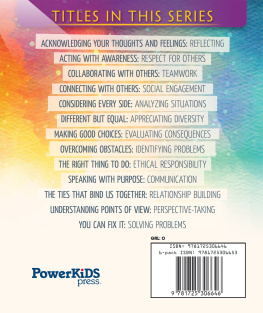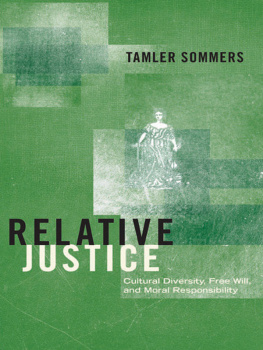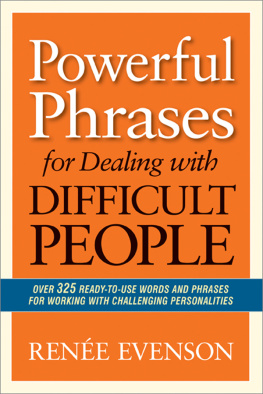Table of Contents
RIVERHEAD BOOKS
Published by the Penguin Group
Penguin Group (USA) Inc., 375 Hudson Street, New York, New York 10014, USA Penguin
Group (Canada), 90 Eglinton Avenue East, Suite 700, Toronto, Ontario M4P 2Y3, Canada
(a division of Pearson Penguin Canada Inc.) Penguin Books Ltd, 80 Strand, London WC2R 0RL,
England Penguin Ireland, 25 St Stephens Green, Dublin 2, Ireland (a division of Penguin Books
Ltd) Penguin Group (Australia), 250 Camberwell Road, Camberwell, Victoria 3124, Australia
(a division of Pearson Australia Group Pty Ltd) Penguin Books India Pvt Ltd, 11 Community
Centre, Panchsheel Park, New Delhi110 017, India Penguin Group (NZ), 67 Apollo Drive,
Rosedale, North Shore 0632, New Zealand (a division of Pearson New Zealand Ltd) Penguin Books
(South Africa) (Pty) Ltd, 24 Sturdee Avenue, Rosebank, Johannesburg 2196, South Africa
Penguin Books Ltd, Registered Offices: 80 Strand, London WC2R 0RL, England
Copyright 2011 by Sam Sommers All rights reserved. No part of this book may be reproduced, scanned, or distributed in any printed or electronic form without permission. Please do not participate in or encourage piracy of copyrighted materials in violation of the authors rights. Purchase only authorized editions. Published simultaneously in Canada
Library of Congress Cataloging-in-Publication Data
Sommers, Sam.
Situations matter : understanding how context transforms your world / Sam Sommers.
p. cm.
ISBN : 978-1-101-55379-4
1. Context effects (Psychology) 2. Decision making. I. Title.
BF714.S
155.9dc23
While the author has made every effort to provide accurate telephone numbers and Internet addresses
at the time of publication, neither the publisher nor the author assumes any responsibility for errors,
or for changes that occur after publication. Further, the publisher does not have any control over
and does not assume any responsibility for author or third-party websites or their content.
http://us.penguingroup.com
For my colleagues, from Allport to Zimbardo,
for work so engaging that its story almost tells itself.
For Saul and Steve, for introducing me to that story
with such enthusiasm and accessibility.
And, mostly, for the enduringly lovely Sommers Ladies, M, A, & S,
for providing distractions unfailingly enjoyable,
regardless of the convenience of their timing.
PROLOGUE
MAMA SAID THERED BE DAYS LIKE THIS. BUT SHE FAILED to mention that mine would keep happening at the Newark airport.
We were on our way from Michigan to Massachusetts for a wedding. Still graduate students, my wife and I were blessed with a flexible schedule but burdened by a fixed income. In other words, we were the perfect guinea pigs for one of those travel websites that offers low fares in return for your relinquishing control over airlines and flight times. So I had typed in our travel dates, agreed to the terms and conditions, and hoped for the best.
Instead, I got Newark.
To be fair, I have nothing against the city propermy only visits have come in the form of airport layovers. And I suppose my repeated experiences of long lines, longer delays, and inexplicable cancellations have had more to do with the airlines Ive flown than the airport itself. But it sure feels like every time the word Newark pops up on my itinerary, the fates conspire against me in new and creatively malevolent ways.
On my previous visit, misfortune had arrived in the form of a last-minute cancellation followed by two equipment-related delays. I ended up on the floor of an overcrowded gate for hours, squeezed between a dozen Hasidic Jews who passed most of their time in prayer. The only silver lining was my corresponding reassurance that God would never let anything bad happen to the plane once it did take off, my own spotty record of synagogue attendance notwithstanding.
But that was then. This time, my problems started with a website itinerary that left just forty minutes to make our connection in Newark. High winds that had briefly delayed our first flight narrowed this time window even further. And, of course, our airline just had to be the one to spread out its gates over multiple terminals, forcing us through a gauntlet of monorails, food courts, and moving walkways on the way to our second flight. When it became clear that the success of the mission might hinge on mere seconds, I decided to dash ahead of my wife, determined to get to the gate and hold the plane for us before the agents closed the boarding door.
Because, as we all know, once they close that door, theres no going back. No, thats nonnegotiable and irreversible. To reopen that doorthat modern incarnation of Pandoras boxwould be unthinkable. Doing so would undermine the very fabric that holds our society together, not to mention disrupt the space-time continuum as we know it. Clearly, you cant reopen that door under any circumstance. Not even when the plane is still parked right outside and its eight minutes until the posted departure time and there isnt another flight from Newark to Boston until late the following morning right around the same time as that wedding youre supposed to attend.
It was demoralizing to see our plane through the window but hear that we were too late to board. Still sweating from my impromptu sprint, I waited for my wife to arrive and then we both dragged ourselves over to the airlines customer service desk along with the other aggrieved passengers whod also stumbled on a surprise New Jersey overnight. Exhausted, our focus shifted from irritation to simply wanting to find out how to get to the hotel where the airline would be putting us up for the night.
But we were in for another surprise. Things in the customer service line werent going so well, either. The first passenger to the desk was a heavyset man with sunglasses perched backward on his enormous shaved head. As his conversation grew increasingly animated, the glasses staring back at the rest of us began to bob up and down rhythmically. He became apoplecticthe glasses speeding up to a discolike tempowhen he learned that thered be no hotel voucher because the delays to his first flight had been caused by weather. He stormed off in a huff, still cursing under his breath as he headed toward the bar.
Next up was a well-dressed woman who seemed just a bit too made-up for the airport. She related her tale of woe, voice trembling with tearful sincerity. She needed to get to Boston to see her sister before surgery, her plans were now ruined, and she demanded a hotel room as well as a full refund. No dice. Marta, as the desk agents bewinged name tag read, wasnt biting, not even when the passengers quiet sniffling devolved into a full-fledged tantrum. After continued hysterics, she finally moved to the side and began furiously punching buttons on her cell phone.
Now it was my turn. Obviously, I needed a different strategy. Yelling wasnt working with Marta. Neither was crying. My wife had grown so discouraged that she had already left the line for the comfort of a nearby bench, taking out a magazine from her carry-on to pass the time.
And thats when I saw the light.
Right at that moment, it dawned on me that I was uniquely equipped to figure out how to successfully navigate this interaction. After all, this is what Id been studying as I worked toward my Ph.D.: the nature of situations. Of course, not this exact situation, involving angry passengers or stoic airline agentsthen, as now, my research examined the ways in which we think and act differently in contexts that are racially diverse, as well as how people make decisions in legal settings like the courtroom. But the basic principle still applied to this, the most mundane of circumstances:










